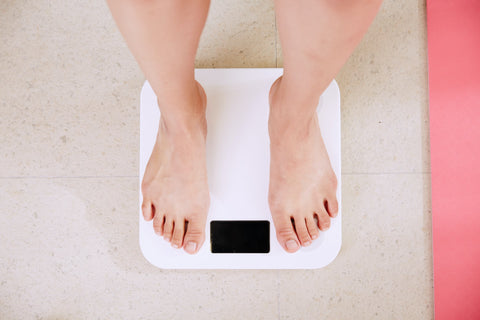Genetic Study Reveals Why You Might Gain Weight from Cold Weather


Why are women more likely than men to gain weight from cold weather?
The seasons are changing! For some of us, that means looking forward to cozy nights by the fire, sipping hot cocoa and reading a good book. For others, winter comes with the dread of gaining extra weight and struggling to get rid of it.
It’s easy to blame your winter weight gain on the comfort food you’re eating and the hibernation mindset that’s keeping you from venturing out into the cold to go to the gym each morning. Actually, the weight you gain from cold weather might be mainly due to your genetics.
New research from the DNA Company shows women are more likely than men to have a certain gene variation that negatively affects their body’s ability to maintain thermoregulation. This often results in additional weight gain during the cold season to insulate vital organs.
Does this sound like you? It may seem like your only hope is to escape to Fiji for the winter, but there are other steps you can take to prevent unhealthy weight gain in cold weather. With the right health regimen, you won’t have to worry about those winter pounds anymore.
The gene behind cold weather weight gain
In order for your body to maintain a healthy temperature when it’s cold, heat needs to be distributed properly throughout your body. This is known as thermoregulation. The gene that’s primarily responsible for thermoregulation is called the UCP1 gene.
When you have the suboptimal version of the UCP1 gene, your body struggles to distribute heat properly. You might feel extra cold in your ears, fingers, and toes as a result of this. Because your body doesn’t generate enough heat to protect your vital organs, it stores extra fat around your abdomen and upper thighs to insulate your organs. That’s why cold weather makes you gain weight.
Another aspect of the suboptimal UCP1 gene is that it gives you a reduced metabolic resting rate. Basically, your metabolism moves much more slowly than someone with the optimal UCP1 gene. This leads to further weight gain.

Other genes that might cause you to gain weight
If you tend to gain weight easily and find it difficult to shed those extra pounds, it’s possible that there is another underlying genetic cause besides the UCP1 gene. In fact, several different genes contribute to your physique, metabolism, and eating habits.
One gene called the MC4R gene determines the hunger cues that go to your brain. Having the irregular version of this gene means your brain might think you’re hungry when your belly is actually full. This leads to extra snacking and hidden calories that cause weight gain.
Another gene that affects your diet is the AMY1 gene. This gene produces the enzyme that allows your body to break down carbohydrates efficiently. Having the suboptimal version of the AMY1 gene means your body struggles to metabolize carbohydrates, often leading to significant weight gain on a high-carb diet. If you have this version of the AMY1 gene, you’ll want to lower your carb intake.
The 5HTTPLR gene is responsible for maintaining your serotonin levels. If you have a deletion in this gene, you may have problems with low serotonin levels. This could cause you to rely on food to bring you comfort during stressful times. These cravings can lead to additional weight gain.
Using intermittent fasting to keep your weight in check
Having the suboptimal version of the UCP1 gene doesn’t mean you need to resign yourself to gaining weight when it’s cold outside. One of the best ways you can improve your metabolic rate and reduce your calorie intake is to start intermittent fasting.
While it may sound difficult to skip meals, intermittent fasting isn’t as hard as it seems. Most people have a fasting period of 16 hours a day with a feeding window of 8 hours. Remember, you’re asleep for most of these 16 hours, so you’re really just skipping breakfast. Always consult with a doctor before starting intermittent fasting if you have a medical condition or a history of eating disorders.
Aside from helping you lose weight, intermittent fasting has numerous other benefits:
- Reduces inflammation
- Improves heart health
- May prevent cancer
- Protects against diabetes
- Increases BDNF levels in the brain
- May increase longevity
Make sure you eat healthy meals during your feeding window so you can actually lose weight. Breaking your fast with soup or a smoothie and then waiting another hour before eating a larger meal will prevent you from overeating.
Give intermittent fasting a shot. If fasting for 16 hours proves to be too difficult for you, change to a schedule of fasting for 14 hours with a 10-hour eating window. Stop immediately if you experience bad side effects such as nausea, headaches, or dizziness.
Are you wondering whether you’re genetically predisposed to gaining weight from cold weather? The best way to find out is by decoding your genes through our 360 DNA Report. You’ll discover whether you have the suboptimal version of the UCP1 gene as well as 37 other custom reports surrounding sleep, diet, nutrition, hormones, fitness, cardiovascular health, immunity, and behavior.
Each custom report includes your genetic tendencies as well as practical steps you can take to optimize your health and wellness. You are a unique individual, and you deserve health strategies that reflect your unique genome. Get started today.

Through a sample of your saliva, we are able to extract the DNA information we need to provide you with a customized DNA 360 Review.
SCAN YOUR DNA NOW












